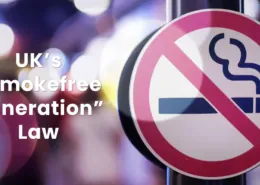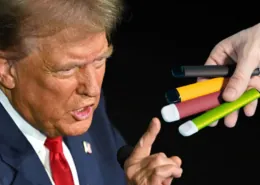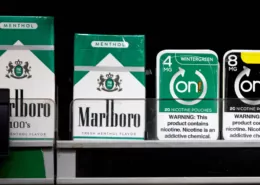The Impacts of the UK’s Disposable Vape Ban
The UK government has announced its plan to ban disposable vapes by June 2025, targeting the dual objectives of environmental protection and curbing the rising trend of vaping among youth. Disposable vapes have gained significant popularity among teenagers, with a staggering five million disposable vapes discarded each week across the UK. The decision also responds to the alarming rate at which young people are adopting vaping habits.
However, the vaping industry warns that this ban could inadvertently fuel the growth of the black market. Without effective controls on imports, illegal sales might flourish, complicating regulatory and enforcement efforts. Elf Bar, a major vape manufacturer globally, has expressed support for the government’s intent but voiced disappointment over the comprehensive ban.
Health Minister Andrew Gwynne emphasized the importance of the ban, stating,
Banning disposable vapes will not only protect the environment but importantly reduce the appeal of vapes to children.
Retail outlets have until June 1, 2025, to clear their existing stocks.
Environmental Impact of Vape Manufacturing
The production of e-cigarettes, especially disposable types, relies on a complex supply chain involving various raw materials and components. Unlike traditional cigarettes, these devices require conflict minerals like tungsten, tin, tantalum, and gold for their microprocessors. Lithium-ion batteries, central to their functioning, call for lithium, copper, and bauxite—materials also critical for other industries such as electric vehicles and renewable energy solutions.
The extraction of these minerals, particularly lithium in the Andean region of South America, involves significant environmental degradation, mainly water consumption in areas already facing scarcity, adversely impacting local communities. This issue worsens with the growing production of disposable e-cigarettes, most of which end up as electronic waste. The copper used in these products also raises major environmental concerns due to its mining processes, which can contaminate water supplies with heavy metals and chemicals, posing risks to both ecosystems and human health.

Advancing Recycling Initiatives
One of the critical challenges with disposable vapes is their recycling complexities. These devices include lithium batteries, known for fire hazards if damaged, and potentially toxic e-liquids. Currently, the UK lacks a comprehensive recycling program for these products, leading to haphazard disposal methods. Different battery types used across various models further complicate these processes.
Experts like Stuart Hayward-Higham, Chief Technical Development & Innovation Officer at SUEZ UK, have highlighted the risks associated with improper disposal, pointing out the dangers of compromised lithium batteries that can ignite spontaneously during transit.
With potential small-scale lithium-ion battery recycling plants expected by 2024, the UK is pushing towards building a robust recycling infrastructure. The regulatory framework is also shifting, with discussions around Extended Producer Responsibility regulations aimed at making producers more accountable for the end-of-life phase of their products. These changes could foster more sustainable practices within the vaping industry.

Transitioning to Reusable Vape Systems
The discussion around disposable vapes also includes the emerging trend towards reusable vaping devices. A survey by Vape Superstore showed that while 66% of respondents primarily used disposable vapes, many are open to switching to reusable systems if disposable ones were banned. The government’s ‘Swap to Stop‘ program further supports this transition by offering free refillable vape kits to adult smokers in England, promoting more sustainable consumer behavior.
Manufacturers are beginning to develop biodegradable components for vapes and introducing recycling schemes for their products. These developments could help alleviate some environmental and public health issues caused by the ban on disposables. However, the industry remains vigilant about the possible rise of a black market if enforcement of the new regulations is not stringent enough.
The UK Vaping Industry Association suggests stronger penalties for retailers who sell to minors and stricter retail licensing to tackle this issue effectively. These measures, combined with efforts to make vaping less appealing to children through packaging regulations, could contribute to controlling youth vaping without resorting to a total ban.
As the vaping market expands, striking a balance between public health concerns, environmental sustainability, and economic implications continues to be a challenge. However, the UK’s proactive measures towards sustainable practices represent a positive step forward in managing these complexities.
Ecigator is one of the well-known vape brands spun off from FM Technology Co., Ltd, it’s an ISO-certified disposable vape manufacturer for OEMs, ODMs, and OBM since 2010. The founder team comes from top firms with more than 10 years of experience in the vaping industry and has devoted thousands of hours to providing users with a better and better experience.

18K Disposable Pod Kit
Disposable Pod Kit – 18ml changeable pod with 650mAh rechargeable battery.
20K with Large Screen
20000 Puffs Disposable Vape with large screen. Normal and Boost working modes.
30K DTL Disposable
30K Puffs DTL(Directly to Lung) disposable vape with airflow control and screen.
- Is It Illegal to Vape or Smoke While Driving in Massachusetts? - August 5, 2025
- Austria Plans to Ban Disposable E-Cigarettes - August 5, 2025
- Vaping vs. THC Drinks: Which Cannabis Option Is Right for You? - August 4, 2025

